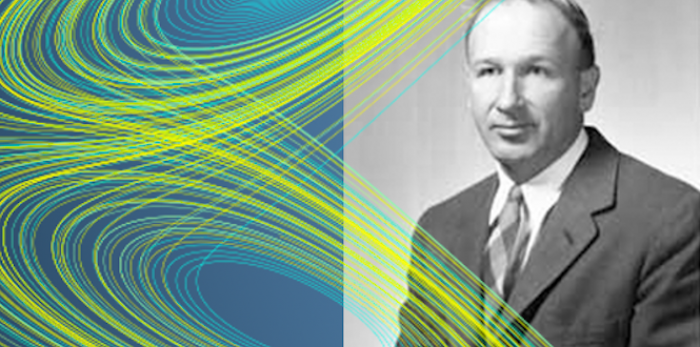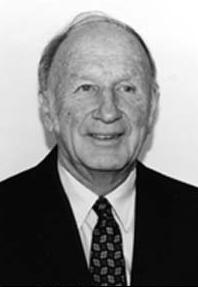Featured Stories, MIT, MIT EAPS, News | May 23, 2017
Happy 100th Birthday to the Father of Chaos
Today, May 23rd, Edward N. Lorenz, longtime professor of meteorology at MIT, would have turned 100. Widely recognized as the father of the modern theory of chaos, he profoundly altered the way we view the natural world.

Lorenz became interested in science at an early age. “As a boy I was always interested in doing things with numbers and was also fascinated by changes in the weather,” he later wrote. After receiving degrees in mathematics from Dartmouth in 1938, and Harvard in 1940, he enlisted in the U.S. Army Air Corps, where he served as a weather forecaster. After the war, he attended MIT, earning a doctorate in 1948 and joining the faculty of the meteorology department in 1953.
Working with a primitive computer in 1961, Lorenz was calculating numerical solutions to a set of twelve ordinary differential equations representing a reduction of the equations governing fluid convection in a box. He wanted to carry a particular integration further in time and so restarted the calculation at about the midpoint of his first run, using the previous numerical output as his starting state. On returning from a coffee break he found that the re-started solution had diverged greatly from the first run. At first suspecting a machine malfunction, he eventually realized that the problem lay in having rounded the initial condition from six to three significant figures. That one-part-in-a-thousand rounding error amplified rapidly and drove the new solution away from the old in a short time.
Lorenz went on to quantify the properties of such systems an express them in terms of the geometry of the attractor set of the equations. Chaotic systems are manifest as the fractal character of their “strange attractors”, as he christened them.

Systems like Lorenz’s original twelve equations and the simpler but nevertheless chaotic set of three equations he published in 1963, have the property that their predictability horizon smoothly goes to infinity as the initial perturbation vanishes. But by the end of the 1960s, Lorenz had demonstrated the existence of slightly more complex systems (in which many scales of motion interact) whose predictability horizon approaches a finite limit as the initial perturbation goes to zero. Such systems, while formally deterministic, are effectively indistinguishable from non-deterministic systems; the limit of vanishing initial perturbation is a singular one. History may well record that this discovery was the last nail in the coffin of Laplace’s clockwork universe.
To casual acquaintances, Ed Lorenz was an almost painfully shy and retiring person, but his close friends and family can recount his enormous enthusiasm for outdoor activities such as cross-country skiing and mountain climbing. To all he was a consummate gentleman, modest to a fault, who showed great respect for his colleagues, friends and family.
Ed was not entirely immune to the philosophical implications of his work. In his 1993 popular account The Essence of Chaos, he muses on the problem of free will in a variation on Pascal’s Wager:
“We must wholeheartedly believe in free will. If free will is a reality, we shall have made the correct choice. If it is not, we shall still not have made an incorrect choice, because we shall not have made any choice at all, not having a free will to do so.”
Note: A symposium dedicated to the work of Jule Charney and Edward Lorenz will take place February 1-2, 2018. Contact eapsinfo@mit.edu requesting to be placed on the email list for notifications.
Read this story at EAPS News.






